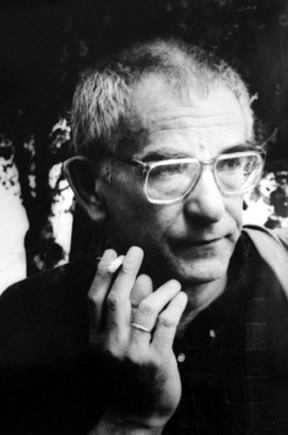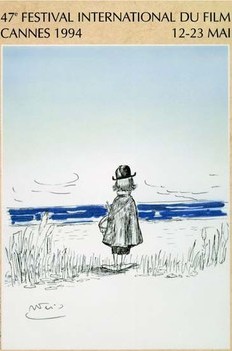
Surveillance is the monitoring of behavior, many activities, or information for the purpose of information gathering, influencing, managing or directing. This can include observation from a distance by means of electronic equipment, such as closed-circuit television (CCTV), or interception of electronically transmitted information like Internet traffic. It can also include simple technical methods, such as human intelligence gathering and postal interception.

Krzysztof Kieślowski was a Polish film director and screenwriter. He is known internationally for Dekalog (1989), The Double Life of Veronique (1991), and the Three Colours trilogy (1993 –1994). Kieślowski received numerous awards during his career, including the Cannes Film Festival Jury Prize (1988), FIPRESCI Prize, and Prize of the Ecumenical Jury (1991); the Venice Film Festival FIPRESCI Prize (1989), Golden Lion (1993), and OCIC Award (1993); and the Berlin International Film Festival Silver Bear (1994). In 1995, he received Academy Award nominations for Best Director and Best Original Screenplay.

NEC Corporation is a Japanese multinational information technology and electronics corporation, headquartered at the NEC Supertower in Minato, Tokyo, Japan. It provides IT and network solutions, including cloud computing, artificial intelligence (AI), Internet of Things (IoT) platform, and telecommunications equipment and software to business enterprises, communications services providers and to government agencies, and has also been the biggest PC vendor in Japan since the 1980s when it launched the PC-8000 series.
A script supervisor is a member of a film crew who oversees the continuity of the motion picture including wardrobe, props, set dressing, hair, makeup and the actions of the actors during a scene. The notes recorded by the script supervisor during the shooting of a scene are used to help the editor cut the scene. They are also responsible for keeping track of the film production unit's daily progress. The script supervisor credit is typically in the closing credits of a motion picture. Script supervisors are a department head and play a crucial role in the shooting of a film. It is the script supervisor's job to monitor the camera shots, seeking to maintain coherence between the scenes.

Camera Buff is a 1979 Polish comedy-drama film written and directed by Krzysztof Kieślowski and starring Jerzy Stuhr. The film is about a humble factory worker whose newfound hobby, amateur film, becomes an obsession, and transforms his modest and formerly contented life. Camera Buff won the Polish Film Festival Golden Lion Award and the FIPRESCI Prize and Golden Prize at the 11th Moscow International Film Festival, and the Berlin International Film Festival Otto Dibelius Film Award in 1980.

Crane World is a 1999 Argentine film, written and directed by Pablo Trapero. The film was produced by Lita Stantic and Pablo Trapero. It features Luis Margani, Adriana Aizemberg, Daniel Valenzuela, among others.

The 47th Cannes Film Festival was held from 12 to 23 May 1994. The Palme d'Or went to the American film Pulp Fiction directed by Quentin Tarantino.
KC Colour Pages and KC White Pages are the classified and residential telephone directories provided specifically for the Kingston Communications service area. KC Colour Pages became the UK's first classified telephone directory when it was first published in 1954 to celebrate KC's 50th anniversary as Hull's telephone company. The Golden Pages, as the first KC Colour Pages was initially called, carried advertising from a wide range of customers including taxis, sail makers, driving schools, painters and decorators and office machinery suppliers amongst others.

Ursula Meier is a French-Swiss film director and screenwriter.

The Solothurn Film Festival (SFT) is the most important festival for Swiss film productions. Founded in 1966 in the Swiss city of Solothurn, the annual festival presents a representative selection of Swiss feature, documentary, and short film productions. In a series of public talks and panel discussions, the audience meets with members of the film industry to discuss the screened films and the culture of film in Switzerland. With over 60,000 visitors every year, the Solothurn Film Festival ranks among the most renowned cultural events in the country.

A television production truck or OB van is a small mobile production control room to allow filming of events and video production at locations outside a regular television studio. They are used for remote broadcasts, outside broadcasting (OB), and electronic field production (EFP). Some require a crew of as many as 30 people, with additional trucks for additional equipment as well as a satellite truck, which transmits video back to the studio by sending it up through a communications satellite using a satellite dish, which then transmits it back down to the studio. Alternatively, some production trucks include a satellite transmitter and satellite dish for this purpose in a single truck body to save space, time and cost.

Fetish & Dreams is a 1985 film by Swiss filmmaker Steff Gruber. The film premiered at the Film Festival Locarno 1985.
Videotelephony as a concept began to materialize shortly after the telephone was patented in 1876, and its history is closely connected to that of the telephone.
Thomas Imbach is an independent filmmaker based in Zürich, Switzerland. With his production company Bachim Films, Imbach produced his own work until 2007. He then founded Okofilm Productions together with director/producer Andrea Staka. All of his films have been released theatrically and Imbach has won numerous awards for his work, both in Switzerland and abroad. With Well Done (1994) and Ghetto (1997) Imbach established his trademark audio-visual style, which is based on a combination of cinema- verité camera-work and fast-paced editing. His fiction features Happiness is a Warm Gun, as well as Lenz (2006), I Was a Swiss Banker (2007) and the fictive autobiography Day is Done (2011) all premiered at the Berlinale. His latest feature film Mary Queen of Scots celebrated its premiere in Locarno and at the Toronto International Film Festival in 2013. His latest documentary Nemesis celebrated its international premiere at International Documentary Film Festival Amsterdam 2020, where it received the Prize for Best Cinematography. Thomas Imbach is currently considered one of the most unconventional and consistent Swiss filmmakers.

Wild Women: Gentle Beasts is a feature documentary by Swiss director Anka Schmid, released in 2015. Schmid documents the life and work of female animal tamers from four nations: Egypt, France, Germany and Russia. The world premiere was at the film festival Visions du Réel in Nyon in April 2015. The international premiere was at the Hof International Film Festival in October 2015.
60 Cycles is a 1965 Canadian short from the National Film Board of Canada directed and photographed by Jean-Claude Labrecque.

Hugo Josef Jaeggi was a Swiss photographer.

Happiness Is a Warm Gun is a feature film by the Swiss director Thomas Imbach, who stages the life and death story of the lovers Petra Kelly and Gert Bastian. Between documentary-like scenes and fictional acting, as well as archive material, the narrative of a love story is created, rolled up from its end. Happiness Is a Warm Gun premiered at the International Locarno Film Festival in August 2001. The film won the Zurich Film Prize 2001 and was nominated for the Swiss Film Prize for best feature film and best leading actress.

The Cambridge Squatter is a 2016 Brazilian film directed by Eliane Caffé. It tells a fictionalised version of the occupation of the Cambridge Hotel in innercity São Paulo. Filmed mainly in the building, actual squatters act alongside well-known Brazilian actors such as José Dumont and Suely Franco.
Nano Babies is a science fiction essay film by Swiss director Thomas Imbach, which he realised in 1998 together with Jürg Hassler. Nano Babies follows everyday life in a crèche at a technical university. Two future-creating worlds - the worlds of the children and their parents - collide. Nano Babies was produced for Swiss television.














